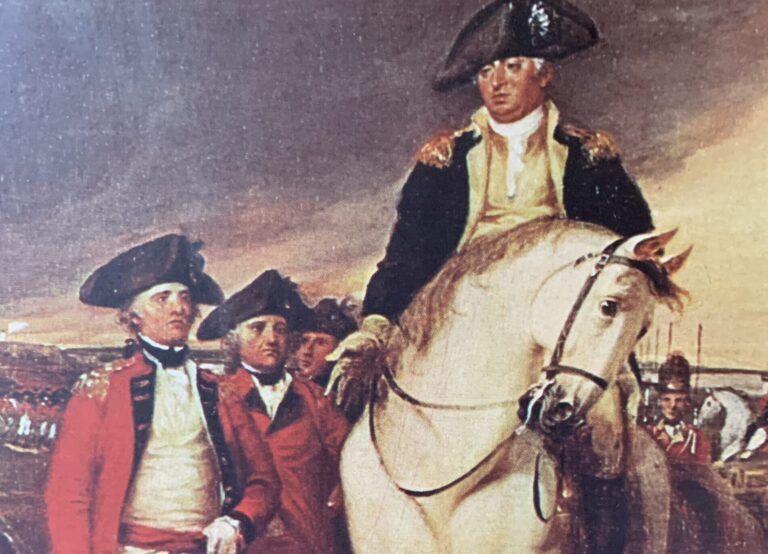The above image from the painting Surrender of Lord Cornwallis by John Trumbull, on display in the US Capitol Rotunda, depicts the capitulation of the British army at Yorktown, Virginia, in October 1781. This engagement ended the last major campaign of the Revolutionary War.
What Factors Contributed to Great Britain’s Failure to Subdue the American Rebellion?
— His Majesty’s forces lacked the military capacity to conquer and control the vast geographic expanse encompassed by Britain’s North American colonies without receiving more support from the Loyalist population (commonly referred to as “Tories” by those opposing them) than the latter were able or willing to provide.
— The rebels did not necessarily have to win battles in order to succeed, but only needed to persevere until the British Parliament exhausted its willingness to expend the mother country’s blood and treasure in this cause, as it did in the wake of the Yorktown disaster.
— Foreign assistance, especially from France but also Spain and the Netherlands—ranging from covert aid in the beginning of the conflict to more conspicuous intervention later on—sustained the American war effort and eventually drew Britain into a global struggle that diverted military and naval resources from its efforts to suppress America’s bid for independence..
Geography as Destiny
I want to amplify the geographic constraints that militated against the possibility of British success. The Crown’s forces never demonstrated an ability to seize and dominate the immensity and wilderness of the territory that comprised the thirteen provinces along the Atlantic coast. Their base was always the Atlantic Ocean and the navigable rivers stretching upcountry from it. British naval assets were essentially useless in the American interior where the crown’s military ambitions were thwarted by rebel opposition and the difficult terrain and hardships of moving an army about, which the letters of General William Howe (commander of the British army in America from 1775 to 1778) to Lord George Germain (Britain’s principal war strategist) and others in London often cited. Moreover, the nature of that terrain was especially problematic for the Crown’s military designs as its predominantly hilly and forested expanse was very different from the Low Countries where most British officers had their formative military experience and was naturally advantageous to those fighting a defensive action, who were usually rebel soldiers.
Finally, Britain’s effort to defeat the colonial insurrection faced the very formidable challenge of an enormous ocean. Each item utilized by the British expeditionary force had to travel three thousand miles across the Atlantic in sluggish transports. And the distances involved were problematic from the standpoint of communications. Even a swift vessel carrying urgent messages rarely made the voyage from England in much less than two months, while some dispatches took anywhere from three to seven months to reach their intended recipient.
Bottom Line
Ultimately, Great Britain’s failure to subdue the American rebellion may well have been the worst calamity ever suffered by its empire, a defeat that at the time constituted a stunning and humiliating setback for the eighteenth century’s most vaunted global power. But history offers numerous examples of a militarily superior force being frustrated by the stubborn reality of geographic expanse and an uninviting terrain. So Napoleon and Hitler learned when they assailed Russia, as did America in Vietnam—and the forces of “Mad Vlad” are, as we speak (or type), contending with in their barbarous enterprise against a free people.
хай живе україна!
